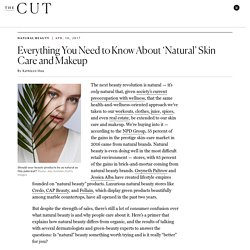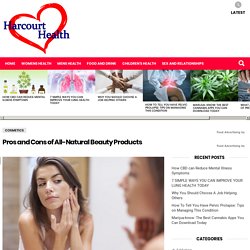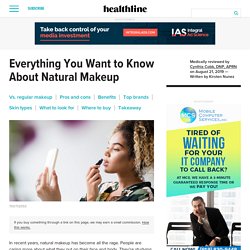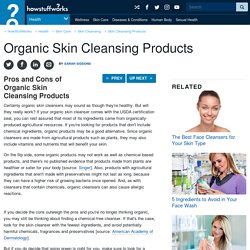

A Guide to Natural Makeup & Skin Care. Should your beauty products be as natural as this palm leaf?

Photo: Ada Summer/Getty Images The next beauty revolution is natural — it’s only natural that, given society’s current preoccupation with wellness, that the same health-and-wellness-oriented approach we’ve taken to our workouts, clothes, juice, spices, and even real estate, be extended to our skin care and makeup. We’re buying into it — according to the NPD Group, 55 percent of the gains in the prestige skin-care market in 2016 came from natural brands. 5 Things You Should Know About Organic Skin Care. Purchasing new beauty products requires a certain level of commitment and trust.

These days, many of us are steering towards a natural-skewing beauty routine: In 2015, market research company Grand View Research predicted that the organic personal care market would grow to be worth almost $16 billion by 2020. If traditional over the counter brands aren't cutting it for you anymore, it may be time to switch to an organic skin care routine. The word "natural" in beauty products has become a bit of a loose term. Much like the term beauty being placed in the eyes of the beholder, what can be considered natural will vary from person to person. Since misuse of the word natural has literally zero consequences for companies, beauty brands can use the term pretty much however they see fit. Companies that hold the trusted USDA organic certified label must follow this list of allowed and prohibited substances in their cosmetics.
It's a lot, right? 1. US Department Of Agriculture 2. The Beauty Chef. Everything you need to know about natural skin care. With reporting by Manon Verchot It turns out beauty is more than skin deep: The average person slathers, lathers, rubs and sprays, 10 different skin care products on his or her body every day--and since our skin acts more like a sponge than a barrier, we absorb the nearly 130 chemicals we regularly expose ourselves to.

Cosmetics companies and the FDA maintain that these chemicals are safe, and many of them are--in small doses at least. But consider that the average woman wears makeup every day, and you begin to understand how a little dab here a quick spray there begins to add up. The fact is, no one really knows how certain chemicals affect us over time, or how they react in our bodies in combination. Other chemicals have known dangers: Phthalates, for example, which are often found in artificial fragrances, are a class of hormone disruptor which can be linked to birth defects, sperm damage, infertility, and the feminization of baby boys, for instance. © Adivasi Body LLC © K Martinko. Pros and Cons of All-Natural Beauty Products - Harcourt Health.
The natural beauty movement is in full swing and seems to be getting stronger every day, with more skincare and cosmetics companies offering a wider range of natural ingredients that are better for your skin.

But there are significant pros and cons to natural beauty products. You probably want to be more natural, from choosing unprocessed foods that contain more nutrients and less processing, to ensuring that what you put on your face is as free of chemicals as possible. This is especially important if you consider that skin absorbs what you put on it. A 2005 study analyzed the umbilical cord blood of newborn babies and shockingly found 287 chemicals present, with 217 of them being neurotoxins. You need to be careful of everything you eat and what you put on your skin because if chemicals can find their way to an unborn baby, they can certainly enter your bloodstream and affect your body in numerous ways. Natural products are seen as a solution to the chemical absorption problem. 1. 2. The Benefits of Using Organic and Natural Skincare.
Benefits of Natural Beauty and Skin Care Products, Argan Life Australia – Providing the Finest Organic Moroccan Argan Oil in Australia. Natural Makeup: What It Means, Benefits, Pros, and Cons. Share on Pinterest If you buy something through a link on this page, we may earn a small commission.

How this works. In recent years, natural makeup has become all the rage. People are caring more about what they put on their face and body. They’re studying labels, researching brands, and learning about potentially harmful substances found in traditional makeup. Consequently, people are turning toward more natural makeup like lipstick colored with fruit pigment. In this article, we’ll explore the differences between natural and regular makeup along with recommendations for the best products. The main difference between natural and regular makeup is the ingredients. 7 Organic Beauty Blogs To Green Your Beauty Routine. Natural skin care uses topical creams and lotions made of... - natashabury21. Pros and Cons of Organic Skin Cleansing Products. Certainly organic skin cleansers may sound as though they're healthy.

But will they really work? If your organic skin cleanser comes with the USDA certification seal, you can rest assured that most of its ingredients came from organically-produced agricultural resources. If you're looking for products that don't include chemical ingredients, organic products may be a good alternative.